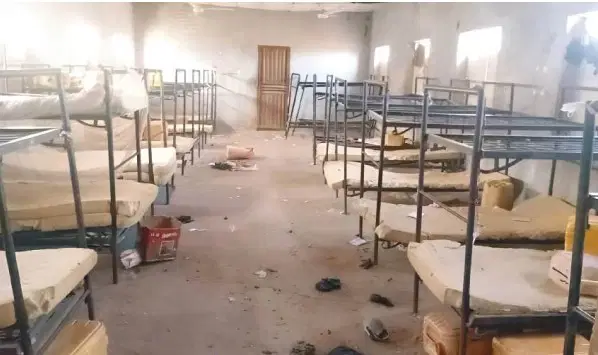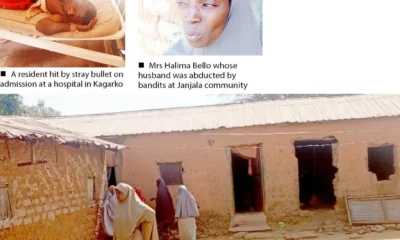News
Under Siege: 2,496 students abducted in 92 school attacks since Chibok

Fresh assaults on schools last week, including two major abductions in Niger and Kebbi states, have revived painful memories of earlier tragedies and renewed questions about the safety of children in parts of Nigeria, particularly the North.
On Friday, gunmen seized 303 students from a Catholic school in Niger State.
The attack came only five days after 25 students were abducted in Kebbi State.
These incidents followed a pattern that has continued since April 2014, when Boko Haram kidnapped 276 girls from Chibok and dragged the world’s attention to the vulnerability of Nigerian schools.
According to Save the Children International and UNICEF, about 70 attacks on schools occurred between April 2014 and December 2022, with more than 1,680 students abducted.
Over 180 children, according to the bodies, were killed, 90 injured, and more than 90 remain missing. About 60 school staff members, they said, were also kidnapped in the same period.
Findings by Sunday Vanguard indicate that between January 2023 and November 2025, Nigeria recorded another 22 attacks on educational institutions, with 816 students kidnapped.
These figures represent only verified incidents reported by police and eyewitnesses.
Many more, especially in remote communities in Niger, Zamfara, Sokoto and Katsina, are believed to have gone unreported.
If those cases were included, the total number of incidents would likely exceed 92.
Rise of a monster
The Chibok abduction marked a turning point.
Boko Haram fighters stormed a local school at night, overpowered guards and carted away 276 girls. Some escaped by jumping from the vehicles, but most were taken into remote forest camps.
Years later, many have returned through rescue operations or negotiated releases, yet UNICEF reports that about 90 are still missing.
Rather than deter future attacks, Chibok opened the way for an escalating crisis.
As Boko Haram’s power shifted, criminal groups in the North-West turned mass abduction into a lucrative business.
Kidnapping students became a reliable source of income, and communities across Kaduna, Katsina, Zamfara, Sokoto, Niger and Kebbi states began to experience recurring assaults.
UNICEF’s monitoring reports show that only 37 percent of schools across ten high-risk states have even basic early-warning systems.
Human Rights Watch, for its part, described the situation as one sustained by impunity, saying bandit groups now attack schools with little fear of consequences.
How each crisis unfolded Chibok, April 2014
Armed militants invaded the Government Girls Secondary School at night, forcing students into trucks and driving them deep into the forest.
The abduction shook the world, sparked the #BringBackOurGirls movement and brought unprecedented scrutiny to the state of school security. Although some girls were rescued or released through negotiations, scores remain unaccounted for ten years later.
Kuriga, Kaduna, March 2024
Gunmen arrived as students assembled for the morning session. Early reports indicated that 287 pupils were taken. The kidnappers reportedly demanded one billion naira. Security experts argued that the steady rise in ransom-driven abductions reflected the state’s inability to disrupt criminal networks.
The human toll
Behind the numbers lies widespread trauma. Many children refuse to return to school out of fear, and parents withdraw others because they can no longer guarantee safety. UNICEF estimates that more than one million Nigerian children have reported fear of attending school due to insecurity. In 2020 alone, about 11,500 schools were closed.
Survivors often struggle with psychological trauma, social stigma and disrupted education. Reintegration programmes remain limited and underfunded, leaving many children without the support they need.
National response
After every major abduction, state and federal authorities issue strong condemnations and promise rescue operations. Some responses have been swift, with security deployments and task force creation. For instance, following the recent Kebbi attack, President Bola Tinubu directed the Minister of Defence to relocate to the state.
However, these reactions have not always translated into consistent action. Some rescues have been quick and coordinated, while others were protracted or incomplete. Analysts argue that the government’s approach has lacked coherence and long-term planning.
Public outrage often follows each incident. Chibok inspired global activism, while later events triggered mass protests, vigils and renewed calls for accountability. International partners also expressed concern and, at times, provided technical support.
Several state governments have temporarily shut schools, strengthened perimeter security or reviewed boarding policies. Yet, many of these measures have been reactive rather than preventive. UNICEF and civil society groups continue to push for full implementation of safe-school standards, better funding, improved law enforcement capacity and reliable early-warning systems.
Human Rights Watch maintains that the cycle of kidnappings reflects structural weaknesses in governance and security planning, and that Nigeria’s most vulnerable communities continue to pay the price.
Ransom dilemma
Although the Federal Government repeatedly denies paying ransom, accounts from communities, parents and independent investigators suggest that ransom payments have occurred in several cases.
Chibok (2016 and 2017 releases)
Multiple reports indicate that about N3 million was paid in two instalments to secure the release of roughly 103 girls.
Kuriga, Kaduna (2024)
SBM Intelligence reported that large sums of cash were delivered in vehicles and then ferried on motorcycles into a forest. The government denied paying ransom.
Greenfield University (2021)
Parents disclosed that they paid ¦ 180 million and provided ten motorcycles after an initial ¦ 55 million “feeding money” was demanded.
Dapchi (2018)
UN documentation suggested that a substantial ransom was paid to secure the release of most of the girls.
Kankara (2020)
Media accounts quoted a ¦ 344 million demand and reported an initial ¦ 30 million payment, though the government denied it.
Tegina, Niger State (2021)
Kidnappers demanded ¦ 110 million. It remains unclear how much was eventually paid.
Afaka (2021)
Some reports alleged that detained criminals were exchanged and about ¦ 15 million was involved.
National concern
Stakeholders warn that unless Nigeria strengthens the systems meant to protect children, the country risks normalising a crisis with long-term consequences for education and national stability.
President of the National Parent and Teacher Association of Nigeria, Alhaji Haruna Danjuma, described the situation as alarming. He said parents were desperate to educate their children but could no longer trust the safety of school environments.
Comrade Alao John, South-West Coordinator of NANS, urged government to secure school environments and resist the growing threat posed by kidnappers.
They, like many voices across the country, insist that Nigeria must confront the structural failures driving these attacks. Without meaningful investment in safe-school standards, clear policy on ransom, stronger intelligence systems and sustained community engagement, the fear and uncertainty that haunt classrooms in northern Nigeria may become a permanent feature of the national landscape.
Timeline of attacks
Here is a timeline of key school kidnapping/mass abduction incidents in Nigeria since 2014, based on reported cases:
14 April 2014: 276 girls abducted from Government Girls’ Secondary School, Chibok, Borno State.
25 May 2017: Igbonla Model College: In Lagos (Epe), armed men abduct six pupils from the college hostel.
19 February 2018: About 110 schoolgirls kidnapped from Government Girls’ Science and Technical College, Dapchi, Yobe State.
11 December 2020: Over 300 boys taken from Government Science Secondary School, Kankara, Katsina State.
17 February 2021: 27 students (plus some staff/relatives) abducted from Government Science College, Kagara, Niger State.
26 February 2021: Around 279 girls taken from Government Girls Science Secondary School, Jangebe, Zamfara State.
11 March 2021: 39 students (23 female, 16 male) kidnapped from Federal College of Forestry Mechanization, Afaka, Kaduna State.
20 April 2021: At least 20 students taken from Greenfield University, Kaduna State.
5 July 2021: Over 120 students abducted from Bethel Baptist High School, Chikun, Kaduna.
30 May 2021: About 200 of Islamic school pupils abducted in Tegina, Niger State.
17 June 2021: About 11 students kidnapped in Yauri, Kebbi State
20 January 2023: LGEA Primary School, Nasarawa: Six pupils kidnapped in early morning raid
20 January 2023: Kidnappers abduct six pupils in Doma, Nassarawa.
14 February 2023: Kidnappers abduct 15 National Youth Service Corps (NYSC) members in Ihiala, Anambra.
28 February 2023: Nine children kidnapped by a 16-year-old teenager in Lagos State.
25 March 2023: Two children abducted in Suleja Local Government Area of Niger State.
2 April 2023: Bandits abduct two students in Bungudu, Zamfara.
8 April 2023: Bandits abduct over 80 children between the ages of 12 and 17 in Tsafe Local Government Area of Zamfara State.
3 April 2023: Eight students of Government Secondary School, Awon in Kachia LGA, and an unspecified number of residents in Kaduna State kidnapped.
21 April 2023: Gunmen abduct a student of a polytechnic in Enugu State.
4 April 2023: At least 10 students of Government Secondary School in Kaduna State abducted during an attack
16 May 2023: Kidnappers abduct about five National Youth Service Corps (NYSC) members in Emuoha, Rivers.
27 May 2023: Kidnappers abduct four children in Njaba, Imo.
14 June 2023: Gunmen abduct seven students of the University of Jos.
24 August 2023: Gunmen attack school, killing one and kidnapping seven students and one teacher in Chikun, Kaduna.
22 September 2023: 24 female students abducted from their hostel at the Federal University Gusau, Zamfara State.
26 September 2023: Gunmen abduct a student of Isa Mustapha Agwai Polytechnic in Lafia, Nasarawa State.
4 October 2023: Suspected terrorists kidnap five female students of Federal University in Katsina
10 October 2023: Gunmen abduct four Nasarawa Varsity students
30 January 2024: Gunmen abduct six pupils + teachers from a school bus of Apostolic Faith School in Ekiti State.
7 March 2024: About 287 pupils kidnapped from LEA School in Kuriga, Kaduna State.
9 March 2024: 15 pupils abducted from a Tsangaya (Islamic) school in Gidan Bakuso, Gada LGA, Sokoto State.
17 November 2025: Bandits kidnap 25 students from Government Girls Secondary School, Kebbi State
21 November 2025: Terrorists raid Niger Catholic school, kidnap 303 students. (Vanguard)
-

 Politics19 hours ago
Politics19 hours agoAtiku’s son resigns from Fintiri’s cabinet
-

 News19 hours ago
News19 hours agoMajor, 3 Soldiers, Hunter Killed In Borno
-

 News19 hours ago
News19 hours agoUmrah Suffers Setback As Airlines Suspend Flights To S/Arabia
-

 News19 hours ago
News19 hours agoRevised Executive Order: FG adjusts oil revenue remittance framework
-

 Politics19 hours ago
Politics19 hours agoDSS arrests social media user who ‘threatened’ Peter Obi after Edo attack
-

 News19 hours ago
News19 hours agoPolice Council Confirms Disu As IG, To Be Sworn In Wednesday
-

 Business19 hours ago
Business19 hours agoPrivate jet flight from Riyadh to Europe now cost N479m as elites flee Middle East tensions – Report
-

 News19 hours ago
News19 hours agoVigilante, Wife, 12 Others Abducted In Kaduna


















